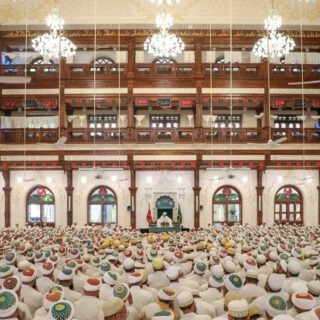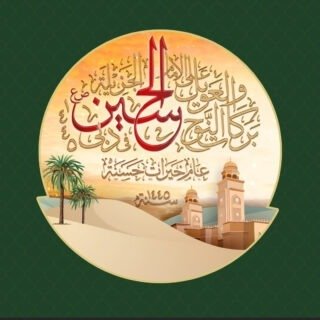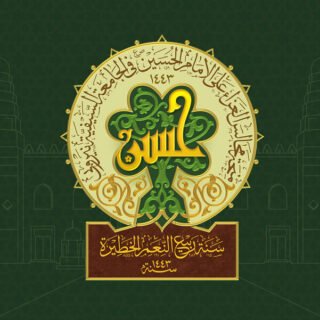Reflections
The Zikra waʿaẓ mubārak of 1441 H took place on a Friday, a day in which ṣalawāt is greatly favored and rewarded, and thus commenced with a call from al-Dai al-Ajal Syedna Mufaddal Saifuddin to all Mumineen to collectively pray ṣalawāt upon Rasul Allah SA and his noble progeny and Ahle Bayt AS. This eternal prayer extends to include the Duat Mutlaqeen AS during the period of satr.
Syedna al-Dai al-Ajal TUS addressed Mumineen as those that prayed to Allah Taʿālā and placed their trust in Him. Therefore, they were appropriately skilled in all manner of craft: acting in accordance with the sharia, seeking all worthy knowledge, praising Him and offering Him gratitude in all circumstances.
Allah Taʿālā states in the Quran:
That is the design of Allah, Who has perfected everything. Surely He is All-Aware of what you do.
Amongst all creation, He created man, in the best, most upright form and at its peak He placed Mumineen. Awliyāʾ Allah AS are the ultimate craftsmen who fashion souls through the moulds of the sharia to become angelic and it is for this that we dedicate our entire love to them. Thus they impart to us the most supreme of treasures, the treasure that breaches the divide between this world and the next.
Maulana Ali AS states:
حرفة المرء كنزه
A man’s profession is his treasure.
‘Profession’ can also refer to an occupation or anything for which one has a passion, is accomplished in and earns a livelihood from. Our occupation is the love of Awliyāʾ Allah AS and that is therefore our treasure, passion and joy. It is by this love that our deeds are accepted and ratified. This love is exemplified by Ziyād al-Aswad who walked hundreds of miles from Khurasan to Madina to see his Maula, Imam Mohammed al-Baqir AS. Such was his perfection in his profession that nothing held him back from his aim; not the lack of resources, nor the frailty of the only mount he could afford which was only able to carry his belongings but not him upon its back. Seeing his utter devotion, Imam AS declared not once but thrice, “Faith is naught but love!”
A man’s skill or craft has three facets: beauty, perfection and piety. These facets are seen in how Maulana Ali AS himself sewed together the torn strap of Rasul Allah’s SA sandal. The beauty of it was in how he set to work there and then, with whatever was at hand. Perfection was seen in that none of the detachment remained and nor would it come undone – alluding to the manner in which he would seam together the rifts of hearts. Finally, the piety was that even when being congratulated for the honour that he would be the one who battled for the tāʾwīl of the Quran just as Rasul Allah SA had done for the tanzīl he kept his head down, absorbed in the task at hand, unassuming.
In respect of skills, crafts and technologies, Mufaddal Maula TUS cited various Fatimi inventions and advances: the ink pen, the use of glass in structures, astronomical calculation tables and calendars, excavation and building upon ancient foundations and advances in medicine. The Al-Azhar University, founded by the Fatemi Imams AS and first established within the confines of al-Jāmiʿ al-Azhar, is a manifestation of their contribution to the causes of knowledge and dedication to all manner of learning.
Extending the theme of counsels of Maulana Ali AS which began with the mawāʿiẓ of this year’s ʿAshara Mubāraka, Syedna al-Dai al-Ajal TUS quoted his saying:
الحرفة مع العفة خير من الغنى مع الفجور
Occupation with piety is worthier than wealth with depravity.
Piety is essential for earning. As an example, on the one hand there is a doctor who treats his patients purely for the sake of healing them. On the other hand, there is a doctor who treats his patient for the sake of earning and in turn indulges in what is unprofessional. He resorts to unscrupulous means which lead to improper treatment, a loss of trust and perhaps even the loss of the license to practice. His occupation, which was his treasure, has been forfeited.
Syedna al-Dai al-Ajal TUS narrated the fable of a woodcutter who came upon a tree which he intended to hew down. As he approached with his saw, the tree spoke up and promised him his daily income if he spared it. As promised, the woodcutter came every day and was given enough to meet his daily needs. However, greed overcame the woodcutter and he desired to cut down the tree so that the entire treasure, which he believed was hidden underneath the tree, could be his in one go. As he raised his hands to fall the tree, it spoke out once more reminding him that it had provided for him, and saved him from destitution. However, he was undeterred and as he raised his hands he froze in place unable to carry out his greedy intent.
Speaking of skilful accomplishments, Syedna al-Dai al-Ajal TUS mentioned architects and engineers, professions which many Mumineen are occupied in. Maulana TUS reminded those entrusted with building the homes of others to use materials of high quality lest they cause harm to someone. He extended this duty of care to the environment stating that trees, which take many years to mature, should not be felled to make way for buildings. The falling of trees is often the easiest option, whereas proper design entails preserving and caring for the natural environment.
Syedna al-Dai al-Ajal TUS then spoke at length of the famed polymath who thrived under the Fatimi Imams, Bu Ali Sina also known as Ibn Sina or Avicenna. An adherent and disciple of the Fatimi imam, he was born in Uzbekistan and is credited with many historic scientific advances. Among these is his famous work called al-Qānūn fī al-Ṭibb, or The Canon of Medicine which, for centuries, remained the central tome for teaching medicine in Europe and elsewhere. Along with his skill and accomplishment, his piety was such that when he found himself at a loss in his work he would take refuge in the masjid and prayer, before returning to his research.
Stories are written of his novel ways of treating the seemingly untreatable. A depressed individual who was diagnosed by him as having the sickness of love. While taking his pulse, Bu Sina came to this conclusion by way of a series of questions. He also treated another suffering from melancholy who insisted he was an animal prime for the slaughter. Bu Ali laid him to the ground, and with a sharpened knife in his hand ready to slay — hesitated. He declared that this animal was so frail it was unfit for slaughter and needed feeding. The delusional man was taken away and as he began eating properly, the rejuvenation of his physical vigour returned his senses as well.
Mufaddal Maula TUS related the incident of Syedi Abdulqadir Hakimuddin QR being held by bandits. As was his wont he awoke for midnight prayers and was reciting the Quran Majeed aloud so melodiously that predators from the woods nearby gathered to hear him. One of the bandits witnessed this astonishing scene and told his henchmen that this is a saintly man whose ill prayer would be devastating to them. With this profound realization, they escorted him back to his home and were rewarded with his dua for them.
Syedna al-Dai al-Ajal TUS spoke at length of the virtues of Maulatona Nafisa QR whose sepulchre was being installed in Cairo, Egypt. She was a lady of great knowledge, and her piety was renowned, such that on one occasion the water of her wuḍūʾ fell upon a girl who was paralyzed and restored her movement. When the flood of the Nile failed the people came to her and she instructed that her dupatta be cast into the river, and upon doing so the plains became awash with the Nile’s waters. She prepared her own grave in which she recited the entire Quran 190 times. She also performed 30 haj, the majority of which were on foot. Her niece, who was with her for 40 years, stated that there was not a single night that she had not spent in ʿibādat and that apart from the two Eids and Ayyām al-Tashrīq (11-13 Zilhijja) all her days were spent fasting.
This was a waʿaẓ mubarak awash with the brimming waters of the rivers of the knowledge of the al-Dai al-Mutlaq, the Fatimi dai, heir to the Fatemi treasures and Nile of their knowledge. Maulana al-Minʿam TUS ended with the shahādat of Imam Husain AS as told by the 50th al-Dai al-Mutlaq, Syedna Abdullah Badruddin RA.
Towards the end, Syedna al-Dai al-Ajal TUS implored every individual present, to ensure their presence in the coming ʿAshara Mubāraka of 1442 H. To the students of Aljamea-tus-Saifiyah was an added directive that their actions and words in bringing tears to the eyes of Mumineen in the grief of Imam Husain AS was the very purpose of their education at Aljamea.
May Allah Taʿālā grant us the tawfīq to render whichever khidmat Maula TUS asks of us with beauty, perfection and piety. May He bless Syedna al-Dai al-Ajal TUS with a long and prosperous life.








